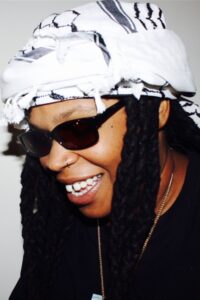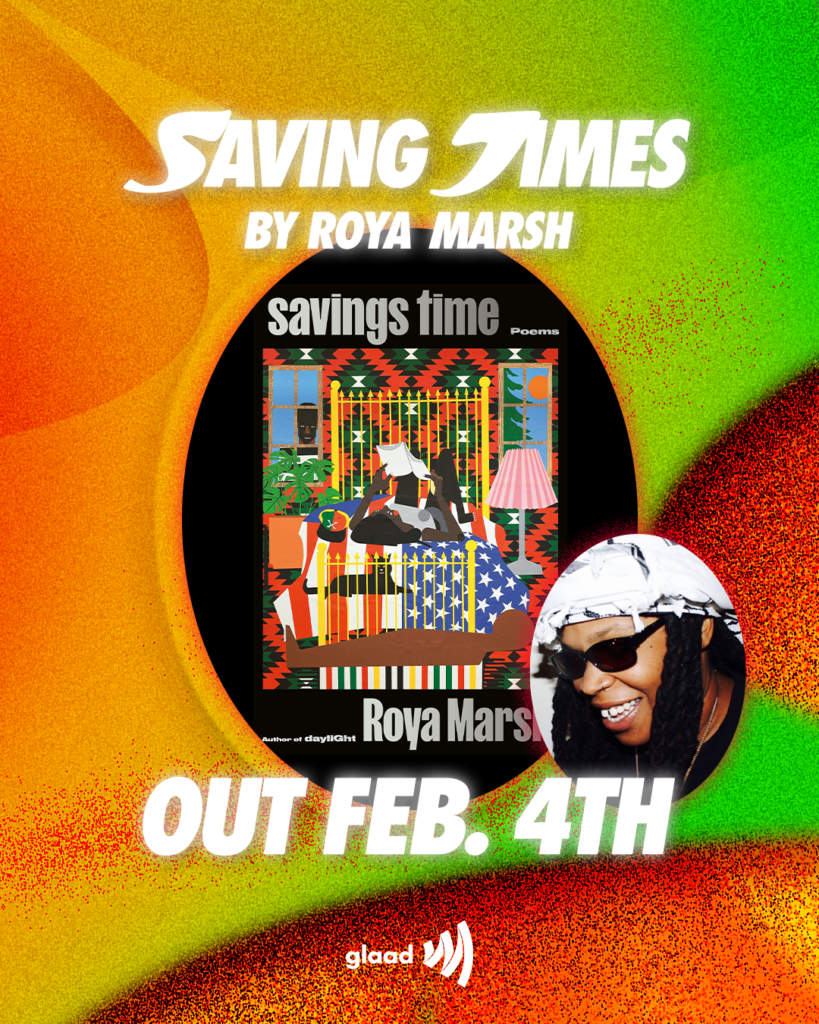“Always maintaining pockets of joy”, is what Roya Marsh said to me as soon as I asked her how she was
Roya Marsh has been a commanding voice in contemporary poetry, using her work to confront injustice, honor the complexities of identity, and illuminate the beauty and struggle of everyday life. With the release of savings time, Marsh delivers another powerful collection that blends urgency with intimacy, weaving together themes of Blackness, queerness, love, and survival. As a poet, educator, and activist, she challenges readers to engage deeply—not just with her words, but with the world around them.
In this interview, Marsh opens up about the inspirations behind savings time, the personal forces that shaped its poems, and the role of poetry as both resistance and refuge. Her writing is sharp and unflinching, yet tender in the ways it navigates grief, time, and transformation. Through her storytelling, she captures the weight of history and the fleeting moments that define us, urging readers to rethink the past while forging new futures.
As a Bronx native, Marsh has consistently used her voice to uplift marginalized communities, advocating for the liberation of Black and LGBTQ+ lives through both her artistry and activism. savings time not only expands her body of work but deepens the conversations she has been fostering for years—about justice, self-preservation, and the legacies we carry.
Throughout our conversation, Marsh reflects on the writing process, the emotions that fuel her poetry, and the responsibility of artists in times of crisis. She discusses the power of language in reclaiming narratives, the lessons she hopes readers take away from Savings Time, and what keeps her pushing forward despite the weight of the world. Her words remind us that poetry is more than art—it is a tool for survival, a space for healing, and a call to action.
Join us as we dive into the mind of Roya Marsh, exploring the depths of savings time and the passion that drives her work. Whether you’re a fan or discovering her poetry for the first time, this conversation is sure to leave you inspired, challenged, and ready to engage with the world in a new way.

GLAAD: You’re a nationally recognized educator, activist, and poet. What first drew you to poetry, and how has your journey in this field evolved over the years?
I was first introduced in school. But not in the same way I’m active in it now. I enjoyed it but always as a writer and less of a performer. When I was in undergrad, I loved the responses I got to what I was sharing. And even it being in a literary magazine. But I didn’t see it as a career yet. Around 2011, I found out what a poetry slam was.
From there I recognized that there are tons of people practicing this art form in the ways I’ve been writing and I didn’t know it. When I was younger I mainly was looking at it like writing rhymes and being heavily hip hop influenced. I was well read too: Baldwin, Alice Walker, Giovanni. There wasn’t a huge burst of blackness in undergrad so when I saw black people telling black stories. It was like wow. I still hadn’t actualized as a poet or writer at this point and was focused on working and survival. But I was still doing poetry in the competitive market.
Others wanted to win, I wanted to look for community. For a period of time I shifted to that competitive personality. And was really toying with stories that I hadn’t already processed or healed from. Others would then dump on me and I was opening myself to little boundaries and oversharing in a space where there was a guise that you would be held but there was no care or social workers.
I worked with youth poets and watched adults who are telling these stories. And breaking open and being free but not recognizing that they don’t have the same resources. It can be a dangerous place but it needs a structure that you only find going through it. Because not everyone has that experience.
It challenges me to be conscious of how you’re writing and who may be in the audience, how to censor harm reduction in this story that I went through. It doesn’t leave me as the hero if I’m not, and starts discussion instead of trying to one up a competitor.
GLAAD: How has your background in spoken word and slam poetry influenced the way you crafted the poems in *savings time*? Do you approach page poetry differently?
Book writing I didn’t see as a thing for me at first. Just on a truth telling journey. It’s such an important gift not to waste and use for the betterment of society. To be willing to say the things that need to be said. That I am one of these people.
It’s not different though. The initial challenge was wanting to look authentic on the page of a book. Thinking about someone who has a different reader’s voice, drastically different from where I live and where I’m from. How do I have them still feel and understand the story? With my voice I can do that, but how do I translate that into text? How can I tell this story that would make them want to think a little deeper, and read a little further? To be kinder to a person?
Same for writing. What can I use in this poem where even if they have so many different ways to enter this poem, they pick up what I’m putting down? Things to symbolize pause or breathlessness, use parenthesis to insert a name because some of the violence we experience is so cyclical you can go through a list of names that could fit within our community. And still we have hope. I hope that when I share this book, it’s for who may not be able to see me on a stage and they can spend more time on something that I’ve said. How far can this book go rather than where my body can be? How to promote literacy? How to remain within the canon of writers who have pushed me to this point? Who have fueled and inspired me to step forward to challenge the status quo. To stand against genocide. It’s something I recognized how impactful one person’s voice can be
GLAAD: In your previous collection, dayLight, you documented your own coming-of-age. How does savings time build upon or diverge from the personal themes of dayLight?
It diverges in many ways. It’s a pursuit of liberation not a sequel. To challenge what’s going on in their environments , family, workplace, community at large. dayLight talks a lot about my experiences with childhood sexual trauma and family issues, savings time is a place where I’ve done with a lot of that. I discuss how I’m using all of that. Not as an aspect of my identity but the ignition to do all I can so that it happens to even less people. You should share and talk about how you’re feeling regardless of what you are told. We shouldn’t shy away from conflict. Say the things that are going to save someone’s time, someone’s life as opposed to staying silent to save face. Our silence doesn’t save us. And how it’s been indoctrinated in a lot of instances for us. Thinking about times my silence may have only been self-serving and that’s not the kind of artist I want to be.
dayLight was a why I’m here.
savings time was a now that we’re here.
GLAAD: *savings time* addresses a wide array of themes, from Black joy to survival to police brutality and gentrification, and socio-political themes, even touching on presidential elections. You’ve even been quoted as saying savings time is both a “love letter” and a “stark statement of Black survival.” And it seems to land perfectly, in a time that our Black queer community needs it the most. What challenges do you face in exposing these truths, and how do you care for yourself while doing this work?
Cleaning while playing a Toni Morrison interview from 1986. And it’s still so cyclical today that it feels like it’d be heard today.
During the writing of savings time you had the pandemic, protests during the pandemic, a portion of all of this is coming out of writing. What once was a toll for self care for me, I can’t say that right now. I’m different while writing all of this. I’m a different person.
Caring for someone is making me have a reason to stay here and breathe and live. If I have to take this dog for a walk, I have to take myself for a walk. And that was when I started walking. To have an experience with earth and nature. Not heading to something. I don’t know if that’s just a New York thing but I don’t want to leave my house only because I’m headed somewhere. I want to engage with my neighbors. I want to hear the crinkle of leaves underneath my feet, real moments.
I do weekly therapy. Where there is a space for someone to tell me if I’m wildin’. This is the first time I’m with a Black woman therapist. I don’t need to explain myself while explaining a very black womanly feeling or experience. And so telling my story is not easy but it’s made it a lot easier.
You find out great news or terrible news, but it’s never the middle news. Family doesn’t tell you about how they’re hungry, or they lost a job. And how experiencing certain traumas, had people been really honest or accountable, it could have been different. And I hope that I can be a model, at the bare minimum, of how liberating it is. Now you can walk lighter when you don’t hold it in. How anger and stress holding it in can affect your health. We don’t have family meetings anymore.
With my writing I want to bring people together, my homies, we are literally all we got. Especially when our ancestors went through worse with less resources.
You should know who lives next to you, what’s going on in local locations. And recognizing the hyper-fixation of the outward is a sign that inside you are not okay

GLAAD: So what’s next? After the official release of savings times, what can audiences looking forward to coming from you and where can they stay up to date and follow along your journey?
This will drop in a really exciting time, my first book came out during national poetry month. This time it’s coming out in black history month. There will be a book launch party at Word Up Community Bookstore’s Recirculation space in Washington Heights. And you can find me on Instagram at @champagnepoet on the internet, and I hope you find me outside so we can engage and work together.
Celebrate Roya’s newest book release at Word Up Community Bookstore’s Recirculation space in Washington Heights on February 7th and register here!













